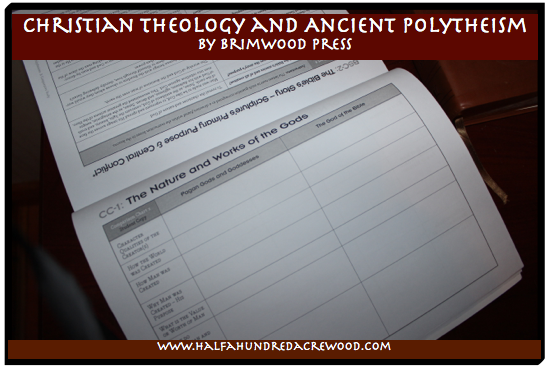“In the same way that the dark deepens one’s appreciation for the light, the ramifications of falsehood make the truth that much more compelling.” (Christian Theology and Ancient Polytheism, page 10)
Even with knowledge of many memorized scriptures, Bible stories, the plan of salvation, and apologetics, youth can still lack an understanding of theology and thus lack a strong Christian worldview. Many times I have thought about what my children will do when they learn about other religions for the first time. I even feared going through a study of world cultures & religions last year. I kept thinking, “How will their faith hold up?” The truth is, their faith is not really their own until it does hold up against such things.
So, I am thankful. Thankful that I have come across the materials offered by Brimwood Press, a company who publishes materials that help families open up dialectic discussion within their home, providing a catalyst for growing their faith together. To say that I have been building my own Christian worldview would be an understatement. I am learning so much by the studies we have embarked upon with Brimwood.
Christian Theology and Ancient Polytheism is a comparative study that takes youth through an examination of ancient polytheism and Christianity using literature.
The study requires a Christian Reader’s Guide (Christian Theology and Ancient Polytheism), the book Secret of the Scribe (one of the Historical Novels for Engaging Thinkers), and the Bible.
The reader’s guide begins with a thorough explanation of each of the main five objectives of the study:
- To teach Christian worldview through teaching Christian Theology
- To teach Christian theology using literary methods
- To juxtapose pagan belief against Christian belief
- To fuel discussion about God’s Word
- To prepare children for the big ideas presented in great books, apart from the challenge of classical literature
The study provides a basis for understanding the character and nature of God and His purposes for creation, which are the foundation for seeing the world through a Christian lens, for “the Gospel begins in Genesis 1.” (page 8)
By journaling and responding to literature (Secret of the Scribe), families mine for meaning as a literary exercise, instead of gathering facts, which is a scientific skill. In fact, I am personally more comfortable with gathering facts, so this study stretches me far beyond what I would do on my own.
Because Christian Theology and Ancient Polytheism is a dialectic study for classical students, much of the questions of definition, comparison, relationship, circumstance, and testimony are built into the reader’s guide. And through this discussion, we work out ideas with dialogue for a more comprehensive understanding of what we believe. This study also encourages us to recognize and wrestle with the big ideas we come across in our reading.
In short, this study helps us to know Whom we worship, what worship is, and why we worship.
This study is written for children ages 10-13 (but I would extend that age range to thirty-something and beyond). All lessons are designed to be read aloud and discussed with no prior teacher preparation. Although their are 25 lessons, this study will take us many months to complete because we go at the pace that promotes the most thorough discussion.
Journaling sheets and comparison charts are included in the guide, taking you through: The Nature and Works of God (and gods), View of Nature, The Great Flood, Worship: Seven Days a Week, Worship through Sacrifice, Worship through Prayer, Consequences of Idolatry vs. True Worship, Hammurabi’s Code and Mosaic Law, Suffering of the Babylonian and Biblical Job, and The Afterlife and Resurrection. Beyond the comparison charts, Christian Theology and Ancient Polytheism includes a study of the grand theme of scripture.
To learn more about this study, visit Brimwood Press. Download the free sample of Christian Theology and Ancient Polytheism here, and the course overview here.
Free Additional Materials:
CTAP Comparison Chart Forms
To see our other adventures with Brimwood Press products, visit our other posts:
-for the dialectic stage (ages 10-13):
Writing Historical Fiction Using Your Family Tree
What about Worldview?
Conversations from the Garden
-for the grammar stage… and beyond (elementary through middle school)
History through the Summer…
Calendar Quest: 5,000 Years of History in 16 Lessons
We received this product in exchange for a review. This post contains affiliate links. To find out why we use affiliate links, I encourage you to read our disclosure policy. By using our affiliate links, you not only allow us to invest in this site and provide Half-a-Hundred-Acre-Wood-funded giveaways to our readers, but you also support ministries from around the world.


